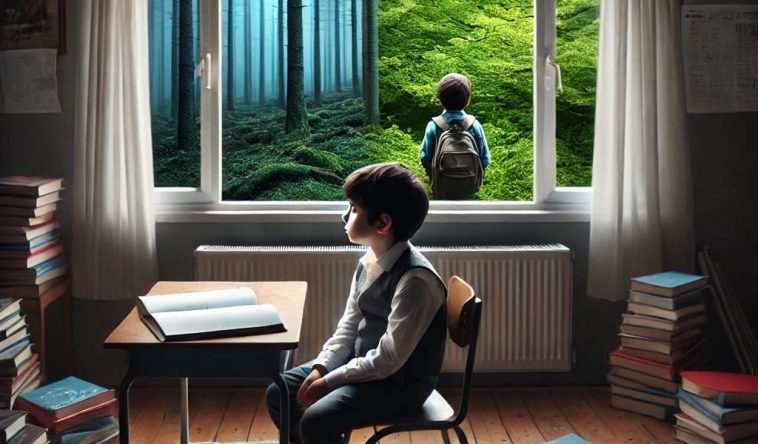This was the most profound realization I had after my diagnosis. It was crucial because, without it, I wouldn’t have known how to live with myself.
When I discovered that the intense emotions I felt and behavioral patterns I exhibited had a name, my first instinct was to eliminate them. The word “disorder” pushed me in that direction. I barely graduated college, bounced from one job to another (still do), avoided socializing—surely this was some kind of neurosis, I thought, and neuroses needed fixing. I convinced myself ADHD was a decayed tooth waiting to be pulled.
I spent the first few months after my diagnosis in crippling frustration, clinging to this disgusting clinical definition:
ADHD is a neurodevelopmental disorder characterized by chronic patterns of inattention, impulsivity, and/or hyperactivity that are inconsistent with developmental norms, leading to significant impairment in social, academic, or occupational functioning.
Looking at it now, that description is dehumanizing—but I followed it as if it were gospel.
The reality was that I suffered greatly not because of my ADHD, but because of my parents. The words they spoke and the decisions they made rendered me estranged. It was never my their intention to cause harm, but their approach to raising me was the exact opposite of what I needed: they took certain constructs for granted, and whenever I faced challenges—in school, in socializing, in daily tasks—they never stopped to ask: what if this wasn’t an issue of attention, but one of incompatibility?
Instead, they relied on discipline as the only solution: withholding rights, denying privileges, banning books outside the curriculum because they “caused inattention,” cutting off the internet, locking TV channels with passwords, and limiting socialization during study time. John Taylor Gatto’s Dumbing Us Down perfectly captured this when he noticed that schools, another place where authority figures hang out, ruthlessly disciplined any child who tried to assert individuality. And my individuality, even to my parents, was weird.
The whole experience was abusive. Yet I forgave: I have other things to attend to if I truly want to get over what happened. What I wish they’d understood, however, is that I wasn’t inherently dysfunctional. It was the assumptions of authority figures that made me appear—and believe—I was. Their well-meaning but oblivious actions, combined with their preaching about the prizes of productivity, turned my strengths into weaknesses. Worse, it left me with a debilitating emotional and intellectual dependency on their approval.
The older I became, the more complicated and invasive this upbringing manifested. I can’t remember how many times I doubted my instinct because it didn’t align with what they called normal. The problem wasn’t in my brain; it was in a childhood spent learning to apologize for how I experienced the world. And so I had to rebuild my understanding: I wasn’t suffering from ADHD; I was suffering from forced assimilation. My ADHD, and yours, is not an isolated “deficit.” It’s a cognitive variation that cracks in environments designed for a narrowly-defined norm: in school and later at work.
Share
As a child, my time was split between home and school, two places with the highest concentration of authority figures. And like all authority figures, mine had a plan for me. Follow it, and you’ll arrive at the destination all humans strive for. They had an answer for every question, and the system had been in place for so long that it seemed ridiculous to even ask for clarification. But the system built within those walls, and the language they used to explain how it worked, ignored one simple fact: my brain desired nothing of their world.
In this system, I was neither good nor bad. I simply existed. You wouldn’t blame a tree because its nature is incompatible with a factory. And trying to integrate it into machinery is absurd. Sure, you could cut it down and force 5% of its essence into the production line. The factory operators would congratulate themselves, maybe even give talks about successfully ‘integrating nature into industry.’ But the tree would no longer be a tree. When your environment treats your natural patterns as problems, no amount of self-improvement can make you feel whole.
As I read more and reflected on the dependent stages of my life, I realized my focus needed to shift. Instead of trying to fix myself, I needed to examine an upbringing incompatible with my ADHD. I had to let go of the instinct to rely on the ideas I was taught—about what makes a person fulfilled—as the foundation for every decision. The question was never, “How do I fix myself?” but rather, “What exactly did they do to the young, oblivious, dependent version of me?”
I’m not alone. This is a story I’ve seen repeated in other males. If you’re an independent, working man struggling with initiation, consistency, or emotional regulation, it’s likely because something went wrong in your upbringing—something deeply unsettling happened to your brain as it developed. This was never a matter of insufficiently-firing neurons: your natural patterns of thinking and being were systematically suppressed. The dissatisfaction and incompleteness you feel stem from what happened—and what could have been—during your formative years. And a simple proof is that even when you become clinically organized or productive by society’s standards, you’re still miserable, perhaps even more so.
The good news is, it can get better. It won’t be easy, but creating an education for yourself—one managed and tailored by you—is one of the most rewarding things you can do. Here’s what I did (and continue to do) to fully embrace the brain I was born with:
Challenge every presupposed, planted conviction. But tread carefully: of course, there will be choices that require humility on your part. Still, take a closer look at the ideas you were fed—when you wore your school uniform, sat down to eat at the dinner table, or defended your actions to a repressive figure. What were the ideas you were taught about the definition of “normal” or “functional,” and how many of those ideas are you still carrying with you?
Question your reflexive guilt when you can’t maintain a routine others consider basic. Examine your shame about being drawn to what they called distractions. Notice how often you internally apologize for passing thoughts. Look closely at your definition of productivity, of time well spent. Who taught you this? Watch for moments when you judge yourself using their measures of progress. Watch how you hide your rhythms because they don’t look professional enough, your reactions because they don’t seem normal enough, your unique ways of arriving at truth because they don’t fit their narrow path of what’s proper and right.
Instead of feeling bad, examine the gap between your current life and the one you yearn for. Every time you call yourself lazy for not starting a task, disorganized for not having a system, or unreliable for missing social cues – you’re speaking in a language you were taught by people who didn’t understand how your mind works. Ask yourself: am I feeling unfulfilled because I’m building on foundations that were never compatible with my mind? That dissatisfaction might not be a sign of personal failure—it might be proof that you’re still measuring success by standards you inherited rather than ones that align with how you naturally operate.
Here are more focused questions I asked (and continue to ask) myself to examine the effects of an incompatible upbringing. The answer might not present itself immediately, so take your time.
What activities or behaviors were you constantly told to stop, though they felt natural to you?
What childhood interests did the current version of you abandon?
Which of your self-criticisms sound exactly like your authority figures?
Remember a really good day in your childhood during which no shame or anxiety were present. What did this day look like?
Whose definition of success are you still trying to live up to?
Look at your core beliefs, especially the ones that leave you disappointed for not being able to stick with them: how many of these did you choose, and how many were chosen for you?
In this landscape, you can feel broken. But the most important truth is that your mind is not. It is a vibrant ecosystem with its own patterns, its own seasons, and its own hard-won beauty. It may never fit self-referential systems, but it was never meant to. Instead, it offers an unconventional, exciting path—one lined with subtle possibilities forming as you read this. And even if no one else can see them, remember that your world is your own. And that’s enough.
Discussion about this post





GIPHY App Key not set. Please check settings